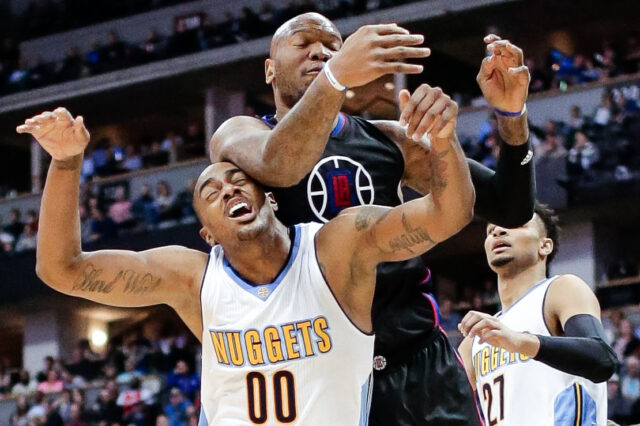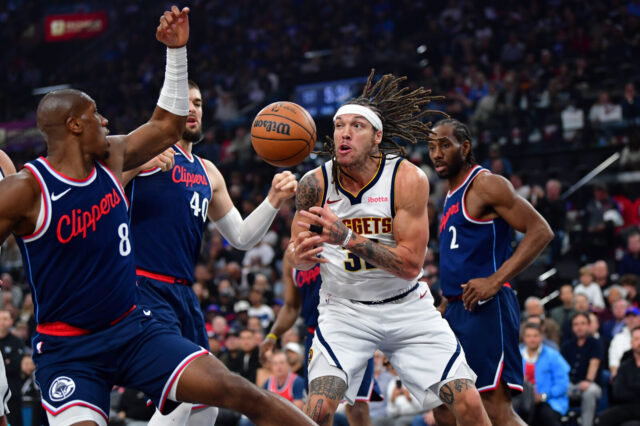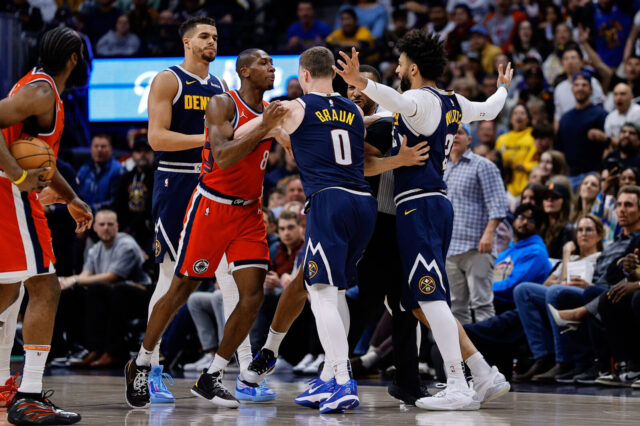“Why not us?”
That’s the question surrounding roughly eight or nine teams during this NBA season. Why not us? Why can’t we win a championship? The Golden State Warriors are breaking up like the Beatles. The defending NBA champion Toronto Raptors just lost Kawhi Leonard. Every other team is as unproven as they can be.
Why not us?
Why not the Denver Nuggets? Why can’t the Denver Nuggets, the team that hasn’t made an NBA Finals since they were in a different league, the team that has advanced to the second round of the playoffs just twice since I was born into this world, make it that far?
Well, history says so. The Nuggets have never won a Finals before. Why start now? Geography says so too. The Nuggets don’t reside in a premier market where stars go to shine in the bright lights of a big city.
What makes the Denver Nuggets different now than they were in those previous failing iterations? Sticking with the school subject theme, let’s start with the chemistry.
This content is no longer available.
The Nuggets are a close knit bunch. They hang out together, have fun, have similar interests, and simply vibe with each other off the court more than many teams in the NBA. Maybe even all of them. This group wants to win, and they want to do it together. Michael Porter Jr., a high profile newcomer with even higher expectations, told the media during training camp that this group roots for each other, no matter who’s out there, and no matter the situation. There will be players sitting out too, so this group will have to have elite chemistry to make it work.
Part of chemistry is continuity though, familiarity with the team, the city, the players, and more. The Nuggets have more continuity than any other team in the NBA, bringing back all nine of their top playoff contributors to go with Porter, Juancho Hernangomez, and Jarred Vanderbilt among players who are familiar with this situation. In trading for Jerami Grant, they added another like-minded individual to the current group of players on this roster—a hard worker that puts his head down and focuses calmly on the task at hand. It seems unlikely that Grant would upset the balance of power and what’s expected of him in Denver.
And now, let’s focus on the math. The Nuggets went 54-28 in 2018-19 and are really talented and really young, but they were young last year too. Perhaps younger at heart. Many members of the roster never experienced the playoffs before last April and May, but now, with a year of experience under their belts, it seems like the Nuggets are ready to grow up even more.
Common sense, considering the age curve and the additions of Grant and Porter, would suggest that the Nuggets are even more loaded than last year. They are ready to break out and be the best team in the West.
But the question is, will they be?
This content is no longer available.
The Nuggets weren’t the only team to make improvements last season. The Los Angeles Clippers added both Kawhi Leonard and Paul George to their roster, upgrading over Danilo Gallinari and Shai Gilgeous-Alexander, as great as those two pieces can be. The Los Angeles Lakers depleted all useful young assets to acquire big man Anthony Davis and pair him with an aging, albeit spectacular LeBron James. The Houston Rockets couldn’t take the Chris Paul-James Harden feuding any longer and decided to acquire Russell Westbrook, adding him to the core of a team that pushed the Golden State Warriors to seven games in the Western Conference Finals just two seasons ago. Even the Utah Jazz added multiple quality starters, including a borderline All-Star guard in Mike Conley, to their core group of Rudy Gobert and Donovan Mitchell.
How can the Nuggets keep up with the influx of talent all around them in the Western Conference? The star power being thrown out there in the last several sentences is mind-boggling. The Nuggets have one top 10 talent in Nikola Jokic, but they sure don’t have two. They might never if Jamal Murray doesn’t exceed expectations or Michael Porter Jr. doesn’t figure it out.
In addition, the Nuggets still have several weaknesses outside of a lack of top end talent when compared to other NBA teams. The defense remains a concern, especially if the starting offense cannot function properly with Torrey Craig starting at small forward. Without Craig in the lineup, the Nuggets have a distinct lack of defensive options against the star wings in the Los Angeles area, and the Nuggets still have yet to solve the James Harden conundrum. The last time they faced Donovan Mitchell and the Jazz, he dropped 46 points on them.
Then there’s the Nuggets’ top level three-point defense which, while technically accurate last year, is unlikely to be the best defense once again this year. Nick Kosmider and Seth Partnow of The Athletic discussed the reasoning behind this three-point defense in an article yesterday as Partnow stated:
“For starters, 3-point field-goal percentage is not a great measure of a team’s defense. The overwhelming majority of evidence suggests that the percentage opponents shoot is largely outside of a defense’s control. This isn’t to say good 3-point defense isn’t a thing; it’s crucial in the modern NBA! But measuring by percentage misses important things. First of all, even on the most open of shots, the league shoots in the low 40s, so there is a lot of “make-or-miss league” built-in. Secondly, even though defensive pressure does tend to reduce opponent shooting percentage, it also causes players to do something else with the ball.
“I think attempt rates are a much better measure of a team’s ability to deny 3-point looks. And … it wasn’t great for the Nuggets there. They allowed 36.6 percent of opponent non-heave attempts to be taken from 3-point range. This alone doesn’t fatally compromise a defense. Milwaukee, for example, allowed the highest proportion of threes in the league at 38.6 percent, but the Bucks also allowed the fewest restricted-area attempts while Denver was 25th. Overall, the Nuggets allowed 71.2 percent of opponent shots to come from these “high value” areas, 22nd in the league”
(Make sure to check out the rest of Kosmider’s discussion with analytics guru Seth Partnow in the hyperlink above)
This happens to be a take I fully agree with and endorse. The Nuggets cannot control how well an opposing team shoots threes against them. It’s a make-or-miss league, and the Nuggets got a bit lucky. That doesn’t mean they can’t get lucky again, and it doesn’t mean they can’t continue to make improvements to their defensive scheme, but it’s hard to see the Nuggets surviving three round of playoff basketball and making their first NBA Finals if it doesn’t improve. The Nuggets added Jerami Grant, who I feel may be underrated by the analytics defensively due to who he played with on a consistent basis in Oklahoma City. Grant is leaps and bounds more attentive and athletic than Trey Lyles, the backup power forward last season. He may even be the answer to Denver’s small forward problem in the playoffs.
This content is no longer available.
But to say one way or the other that the Nuggets are definitely the best team or they don’t have a chance this season would be ludicrous. Either way, there’s a lot of gray area for the first time in the last several NBA seasons as to who the true contenders are. Maybe the Nuggets figure out the defense with more consistency while improving their offense to top five levels? Not an otherworldly improvement for a young team. Maybe the Nuggets still have these questions in the postseason but they run into a Lakers team with Anthony Davis dealing with more nagging injuries. Certainly not out of the question.
Either way, this is the year for the Nuggets to either say “we’re not quite ready yet” or “we’re coming for the crown because we know we’re good enough.” Both scenarios are possible. The Nuggets have that much talent and are well positioned to acquire more if necessary.
Will the Nuggets be the best in the West? It’s all conjecture at this point, but I have a feeling the Nuggets will answer that question many times over this season.


